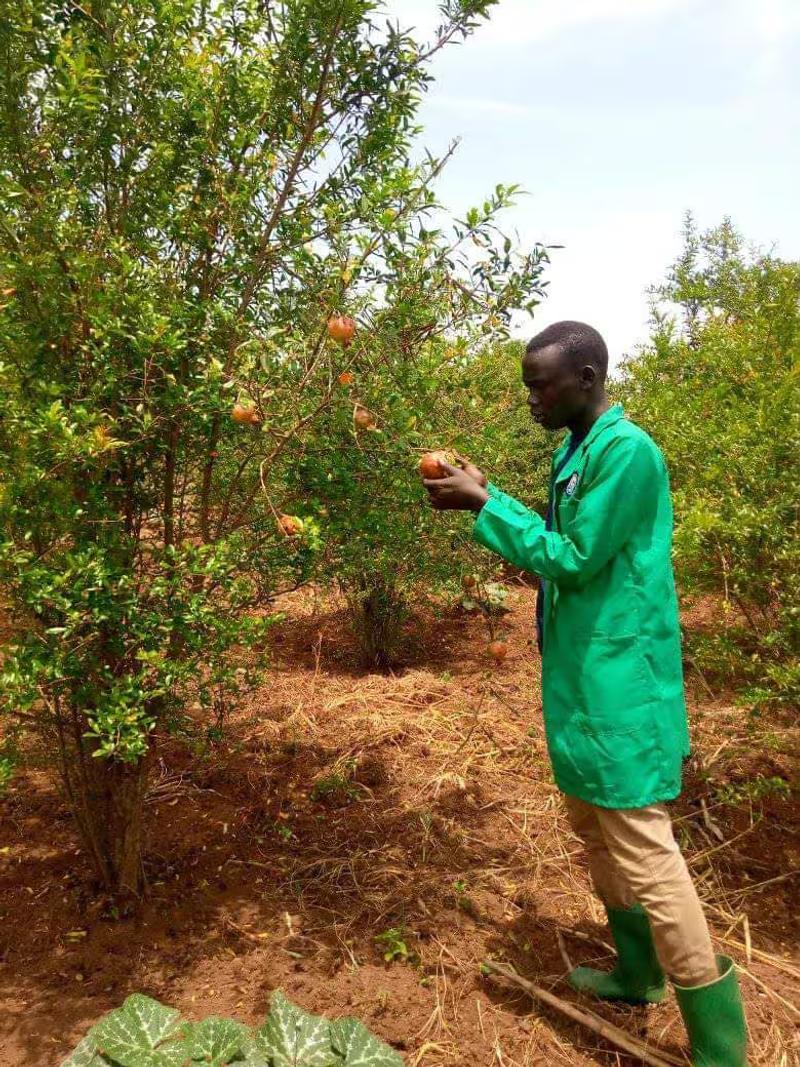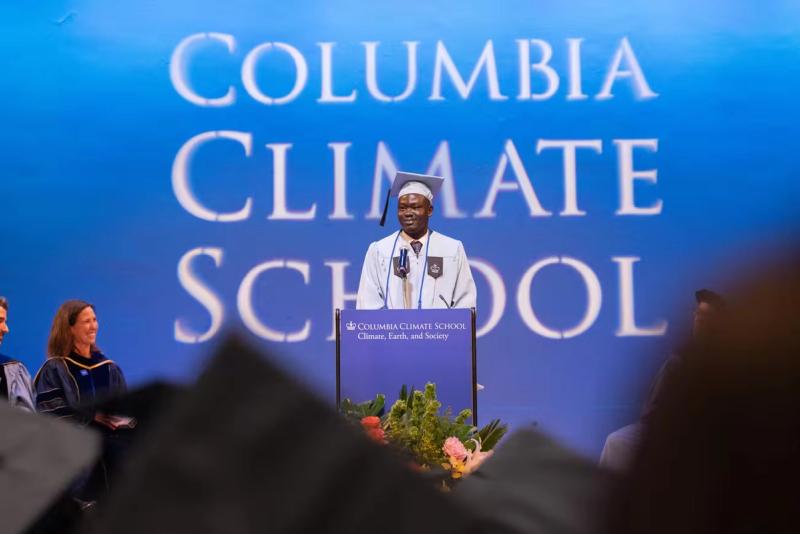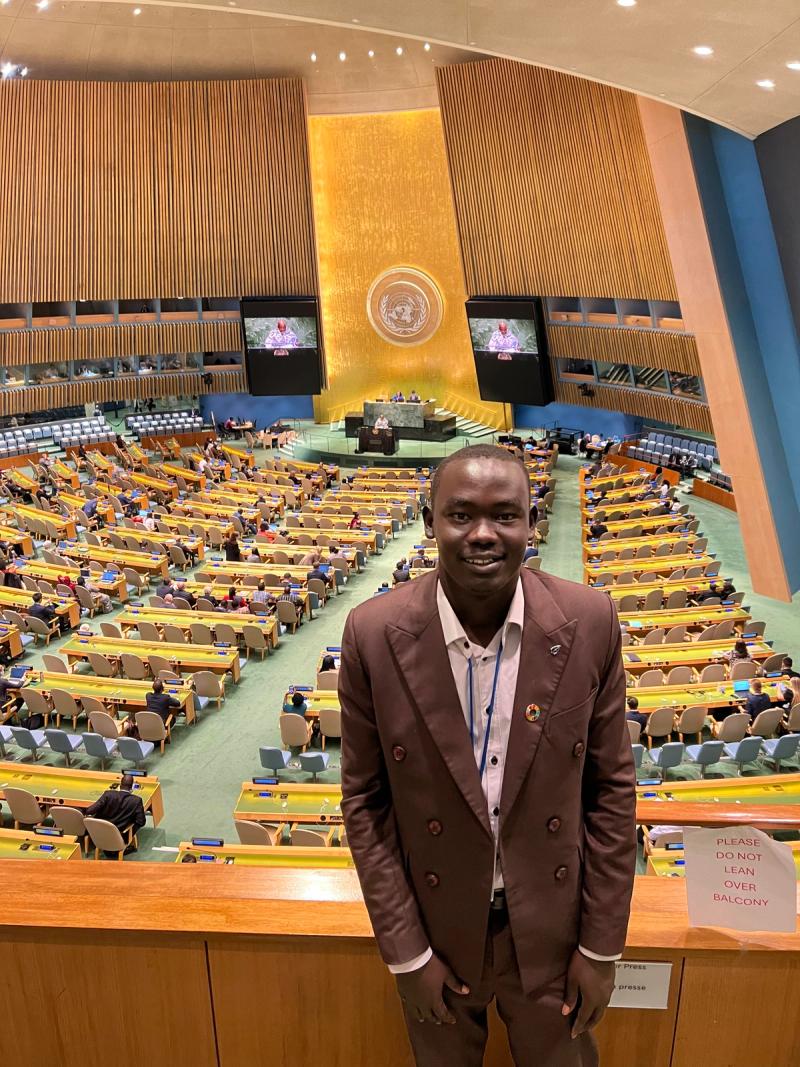From Floods to Resilience: A Refugee Scholar’s Journey to Climate Leadership

How a displaced student brought climate lessons learned on a farm in Uganda to the United Nations.
The muddy waters rose higher than they had in years, swallowing the rows of sesame crops that stretched across the northern Uganda farmland. Anyieth Philip Ayuen watched as 90% of his harvest disappeared beneath the churning flood. Months of labor and cultivation, gone. For most 23-year-olds, this would have been devastating. For Anyieth, a refugee from South Sudan who had already overcome displacement, hunger, and war, it became the moment that would reshape his life’s purpose.
"One of my uncle’s wives, who worked on the farm with me, asked if there was anything I could have known to prevent the loss," Anyieth recalls of that day in 2023. He had a bachelor’s degree in agriculture and direct farming experience. But he had not anticipated the impact of climate change.
Today, Anyieth Philip Ayuen works at the United Nations, supporting the Climate Action Team of the Executive Office of the Secretary General. He graduated from Columbia's Climate School on a Columbia University Displaced Student Scholarship. His journey from refugee to a career track addressing climate change points to a crucial reality: those most affected by climate change are needed to help solve it. His story reveals why lived experience from the front lines of the climate crisis must shape global solutions.
Growing Up Between Wars and Borders
Anyieth’s story began in the floodplains of the White Nile in South Sudan, where annual flooding was a fact of life. Born as the third of six children, he watched his father — a soldier who fought for South Sudan’s independence for 21 years — struggle to provide for the family. When civil war erupted in 2013, Anyieth’s family fled to Uganda as refugees, joining nearly 1 million South Sudanese seeking safety.
In Uganda’s Bidi-Bidi refugee settlement — one of the world’s largest — Anyieth experienced severe food insecurity. World Food Programme rations had dwindled from 12 kilograms per person to four as international aid diminished. Refugees survived on $10 per month. "There were many times we didn’t eat for up to three days," he says.
Education became his path forward. He walked 20 kilometers to school daily, often on an empty stomach. Despite these hardships, he excelled academically and was accepted into Bugema University, one of Uganda’s top schools. Thanks to a scholarship from the UN Refugee Agency, he not only matriculated, Anyieth graduated as one of the top students and immediately established a 10-acre farm to grow sesame, beans, corn and other crops to address the food insecurity he had witnessed firsthand.

When Climate Changed Everything
Then came the 2023 flood. The destruction of his sesame crop was part of increasingly erratic weather patterns affecting East Africa. Traditional farming knowledge was failing as rainfall became unpredictable and extreme weather intensified.
"I saw how badly our food was being affected by climate and wanted to understand how we could build agricultural resilience," Anyieth reflects. He found Columbia University’s Climate School and applied for the Columbia University Scholarship for Displaced Students. The application process was tough — three months of preparation while managing his failing farm and the Dongriin Foundation, a refugee-led organization he co-founded to support fellow refugees pursuing education.
Anyieth was accepted by Columbia in February 2024 and arrived in New York later that summer, flying on an airplane for the very first time. The first weeks were difficult. He found the food unfamiliar and New York’s culture isolating: "In my culture, you are never lonely," Anyieth explains. "In New York, no one in my apartment building wanted to engage in conversation with me." He survived on tea, bread, and peanut butter, feeling desperately homesick. Desperate for a feeling of connection, he reached out to a distant South Sudanese relative in Pennsylvania. The home visit with his relative’s family included home-cooked food and guidance to help Anyieth acclimate.
From Isolation to Leadership
With renewed energy, Anyieth returned to New York and threw himself into Columbia’s M.A. in Climate and Society program, choosing courses that connected his lived experiences to global climate science. He also engaged as a research assistant at Columbia’s National Center for Disaster Preparedness, where he worked on integrating climate literacy into emergency management practices and developing frameworks for sustainable disaster response.
It was not long before his peers noticed his leadership abilities. Despite initially declining a nomination — citing his unfamiliarity with American systems — Anyieth was elected Vice President of External Affairs for the Columbia Climate School Graduate Council and later chosen as the 2025 Class Day speaker.

"We, the class of 2025, are not just witnesses to these [climate] events; we are the architects of solutions; we are the scientists, policymakers," Anyieth told his graduating classmates in May 2025. He shared with raw honesty: "As a displaced person, I know the heartache of losing your home, your country, a sense of belonging, of losing the certainty of tomorrow to extreme events."
Now, after graduating in May 2025, Anyieth works with the United Nations Climate Action Team in the Executive Office of the Secretary General as a Program Management Intern. He supports high-level meetings, helps draft policy proposals, and tracks global climate commitments from state and non-state actors, working directly under the Chief of Staff at UN headquarters in New York.
“At a moment of geopolitical uncertainty and division, climate justice remains at the heart of the Secretary-General’s Climate Action Strategy. Anyieth is playing a vital role in ensuring that the voices and needs of those on the frontlines of the climate crisis are heard, respected, and never forgotten.”
Selwin Hart, UN Secretary General’s Special Adviser on Climate Action
For Anyieth, his mission remains clear: to ensure that no community faces the devastating choice between staying home to face climate disasters or fleeing to uncertain futures as refugees. In a world where climate change increasingly drives displacement, his path from South Sudan to the United Nations was unnecessarily difficult — a reminder of how many barriers still prevent those with critical lived experiences from contributing to global solutions.

Columbia Global connects students, scholars, and partners across disciplines and borders to tackle the world’s most urgent challenges — from climate change to displacement. Through the Road to COP30 series, Columbia Global is addressing climate change issues from regional perspectives, ensuring that local insights inform global negotiations. Our work with displaced students and scholars, including the Emerging Scholars Fellowship Program, ensures that those most affected by crises have a voice in shaping solutions.